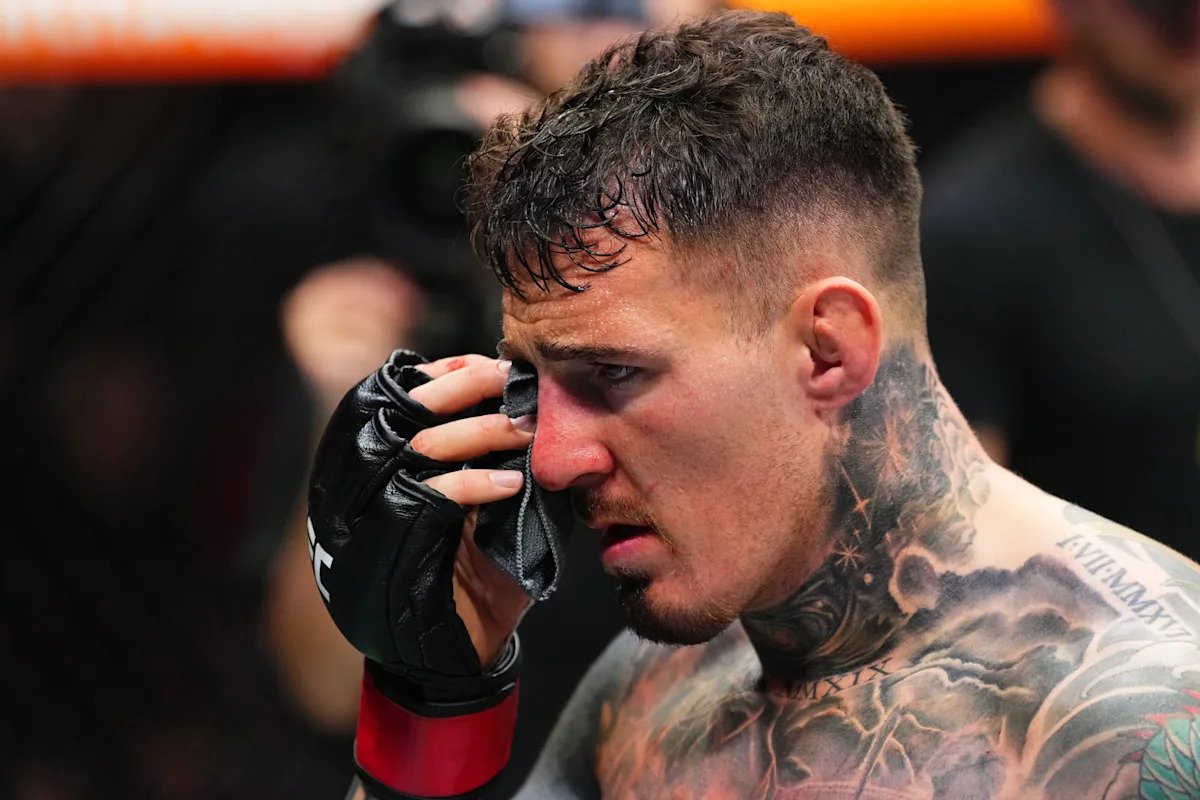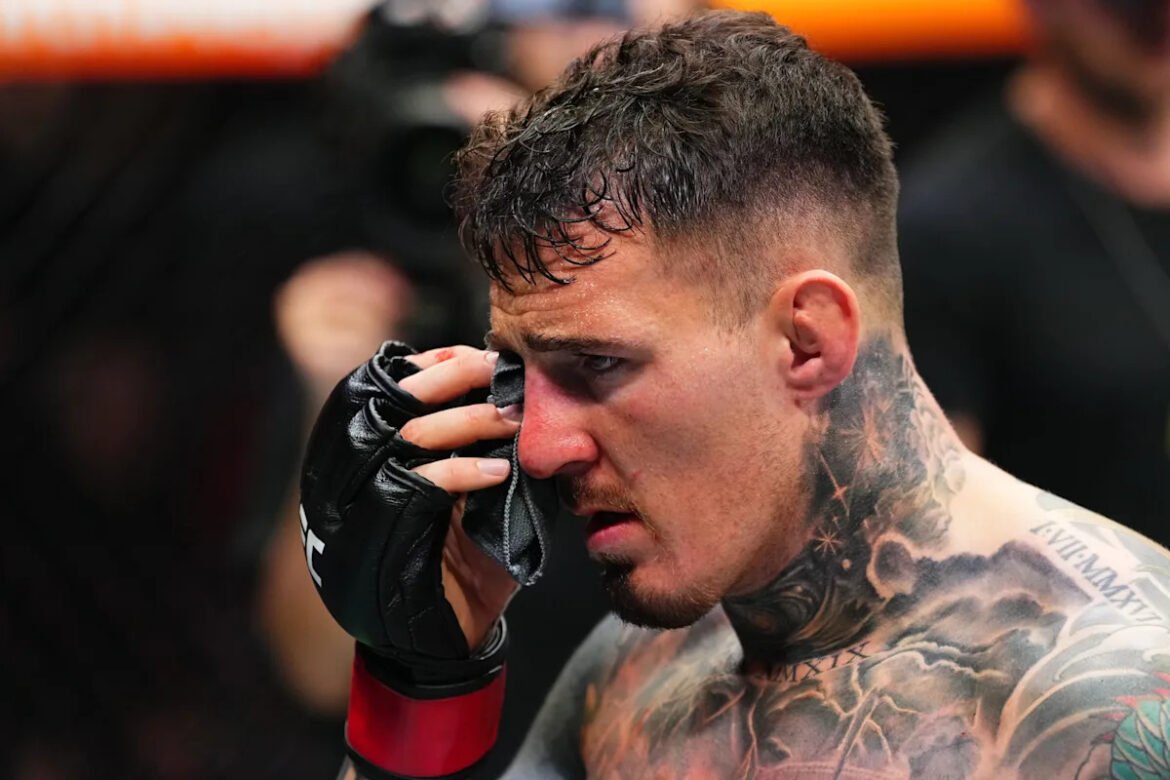
Hey there, couldn’t help but notice some of the ol’ discourse happening in the MMA space regarding the no-contest finish to the UFC 321 main event on Saturday. You know the one. The heavyweight title fight where Tom Aspinall got gouged in both eyes by Ciryl Gane and then decided he’d actually rather not continue fighting blind with his UFC championship on the line? Yeah, that one.
I just have a quick question for those of you who have been critical of Aspinall in the aftermath. It’s a simple question and it goes like this: Are you completely out of your minds?
Advertisement
I ask this not from a place of judgment but from curiosity. I’d genuinely like to know what you saw when Gane gripped Aspinall’s eye sockets like a bowling ball, and how your brain interpreted the resulting stoppage to be the champ’s fault.
Some of this fallout is predictable. We were expecting a heavyweight firefight on Saturday in Abu Dhabi. Some of us even paid the full pay-per-view price to see it. So when instead we got less than one full round and nothing resembling a satisfying conclusion, some of us got frustrated and upset. What usually happens then is a lightning round edition of The Blame Game, because fight fans are uniquely primed to expect a hero and a villain in every situation.
What I can’t understand is how so many people decided that the guy with the fingers in his eyes — plural — was the one in the wrong. Did they not see what I saw? Did they miss the part where Gane had a finger on each of Aspinall’s eyeballs? Did they also miss the part of the replay where the tips of those fingers briefly disappear into Aspinall’s ocular cavities?
Advertisement
Maybe they’ve never been poked in the eye before, but it’s actually pretty unpleasant. In addition to hurting like hell, it’s also been known to affect a person’s vision. And being able to see is honestly pretty important in a prize fight. It’s right up there with being able to move as a top predictor of success or failure.
Part of the problem, I suspect, is that we’ve gotten too used to a certain order of events. Typically it goes:
– Fighter A gets poked in the eye by Fighter B.
– Fighter B acts shocked and innocent while Fighter A walks around wincing and blinking for a couple minutes.
– The restless crowd murmurs and then boos at the prospect of being denied a bloody and decisive ending.
Advertisement
– Fighter A is pressured into continuing, only to eventually lose to Fighter B.
That last part is important, by the way. Statistics on this kind of thing may vary, but according to at least one study cited in a judging and refereeing course, fighters who poke their opponent in the eye during the first round go on to win the fight 74% of the time. Not surprisingly, diminishing your opponent’s ability to see would seem to confer certain advantages.
We don’t really want to hear that as fight fans, though. Guy gets poked in the eye and we expect that he will not even consider the question of whether or not it’s a good idea to continue fighting. All we want to know is can he continue.
No one disputes that UFC heavyweight champ Tom Aspinall was badly fouled by challenger Ciryl Gane at UFC 321, so why are we blaming the guy who didn’t break the rules?
(GIUSEPPE CACACE via Getty Images)
Which, when you think about it, is absurd. Because yeah, Aspinall could have kept fighting with only one fully functioning eyeball. He could have fought with zero eyes, really. It would have been extremely stupid, but it would have been absolutely possible. It’s also the kind of thing we have no right to expect.
Advertisement
Aspinall came into this fight as the reigning UFC heavyweight champion. Setting aside for the moment all the bad things that can happen to your health and well-being if you stumble blindly forward at a heavyweight pro fighter, Aspinall had a lot to lose career-wise in this fight. But for some reason we become unreasonably angry if we even suspect that he might be taking all that into account. We expect him to fight on until he is physically incapacitated, even after he’s fouled in such a way that makes that suddenly much more likely.
And that, too, is important to remember. Aspinall was out there trying to fight. He desperately wanted to fight. It was Gane who broke the rules by nearly scratching Aspinall’s brain stem by way of his corneas. No one disputes this. Yet they want to blame Aspinall for the premature end to the fight, which effectively gives a free pass to the one person who was actually responsible.
This is one of the reasons why cheating works in MMA. It’s because we’re so quick to put the pressure on the cheated rather than the cheater. You can do almost anything you like in a fight — except quit. That’s the unforgivable sin, even when we all agree you were badly fouled.
Advertisement
The other reason it works is because there are almost never any consequences for the guy who breaks the rules. He’ll get a warning, probably. In very rare instances, he may lose a point on the scorecard. But if he can scrape away a bit of your vision in the first round, and if that helps him knock you out before the ending of the fifth, that point means nothing at all. Hell, go ahead and take two points, one for each eye Gane speared.
If it leaves the champ even just a little less capable of seeing the punches headed his way as soon as the fight restarts, it’s a good trade for the challenger. When that’s the reality we’re willing to accept, why wouldn’t you cheat in every MMA fight? Put the onus on the other guy to prove what a tough guy he is by soldiering through it. Only if he declines does the whole thing backfire, and even then only in the cop-out form of an empty no-contest.
I know we want satisfying conclusions, especially when we paid good money to see some definitive answers to heavyweight questions. But when we’re denied that because of a clear abuse of the rules, maybe it’s not the abused we should leap to blame. MMA has come a long way since it’s no-holds-barred days. Telling a champion he has to choose between fighting half-blind or getting showered with scorn is really just admitting that you wouldn’t mind going back.

